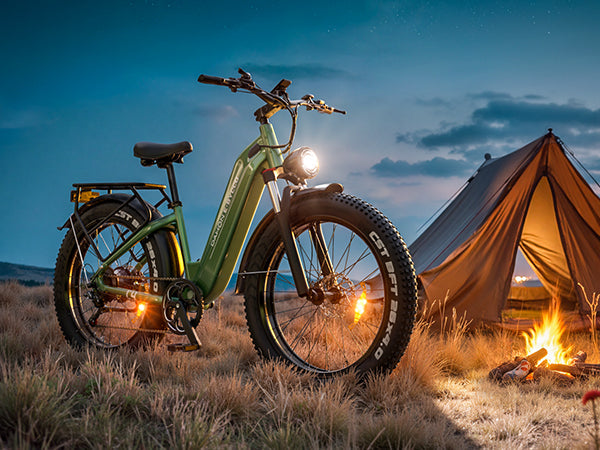When it comes to ensuring safe, smooth, and reliable braking performance on your electric bike, the type of brake system you use plays a significant role. Among the various braking systems available, hydraulic brakes and mechanical disc brakes are the two most popular choices. But what makes hydraulic brakes stand out? Why are hydraulic brakes considered better than ordinary mechanical disc brakes? Let’s take a closer look.
What Are Hydraulic Brakes?
Hydraulic brakes operate using hydraulic fluid (typically brake fluid or mineral oil) to transfer force from the brake lever to the brake caliper. When you pull the brake lever, the hydraulic fluid is pressurized and pushes the brake pads against the rotor, slowing down or stopping the bike.

What Are Mechanical Disc Brakes?
Mechanical disc brakes, also known as cable-actuated brakes, use a steel cable to transmit force from the brake lever to the brake caliper. When you pull the brake lever, it pulls the cable, which then moves the brake pads to apply pressure to the rotor.
Key Differences Between Hydraulic and Mechanical Brakes
Braking Power Hydraulic brakes deliver significantly more braking power than mechanical brakes. Because the hydraulic system uses fluid to transmit force, it’s much more efficient at converting the force you apply to the lever into braking power. This means hydraulic brakes can stop your e-bike faster and more effectively, especially when riding at higher speeds or in challenging terrain.

Modulation and Control Hydraulic brakes offer superior modulation, which is the ability to apply varying levels of braking force. This makes it easier to fine-tune your braking, offering smoother, more controlled deceleration. Mechanical brakes, on the other hand, can feel abrupt and lack the subtlety of hydraulic braking, often leading to jerky stops.
Reduced Hand Effort One of the significant advantages of hydraulic brakes is that they require less effort from the rider. The hydraulic system amplifies the force you apply to the brake lever, meaning you can stop more efficiently with less effort. This is especially beneficial for longer rides, descents, or riders with limited hand strength. Mechanical brakes require more force from the rider, making them less efficient in comparison.
Consistency and Performance Hydraulic brakes are more consistent in their performance, especially over time. The sealed system ensures that the hydraulic fluid remains clean and unaffected by dirt, water, or weather conditions. This results in consistent braking performance in all conditions. Mechanical brakes, on the other hand, are more vulnerable to environmental factors like dirt, mud, and moisture, which can affect their performance and require more maintenance.
Less Maintenance While both systems require maintenance, hydraulic brakes generally require less frequent adjustments than mechanical brakes. Mechanical brakes can stretch over time, especially under heavy use, meaning you’ll need to regularly adjust the brake cables to ensure proper performance. Hydraulic brakes, however, maintain their performance for much longer without the need for constant adjustments. The hydraulic system is also less likely to suffer from issues like cable stretch or corrosion.
Durability and Longevity Hydraulic brakes tend to last longer than mechanical brakes, primarily due to the sealed nature of the hydraulic system. With mechanical brakes, the brake pads and cables can wear out more quickly, and environmental conditions can take a toll on their durability. Hydraulic systems are more robust and provide more reliable, long-lasting performance in various weather conditions.
Weight Considerations While hydraulic brakes are typically a bit heavier than mechanical brakes due to the fluid and calipers, the added weight is often considered worth the increased performance. In high-performance e-bikes, where efficiency and control are paramount, the benefits of hydraulic brakes far outweigh the minor increase in weight.
Why You Should Choose Hydraulic Brakes for Your E-Bike
If you're looking to enhance your e-bike's braking system, hydraulic brakes are the clear choice. Whether you're an avid cyclist who enjoys mountain biking, long-distance commuting, or just need a reliable braking system for city riding, hydraulic brakes offer a level of performance, control, and durability that mechanical brakes simply can't match.
For e-bike riders, hydraulic brakes are particularly beneficial because they can handle the higher speeds, heavier loads, and added power that e-bikes deliver. They offer superior stopping power and greater safety, which is crucial when riding on busy streets or tackling off-road trails.
Conclusion
When deciding between hydraulic and mechanical brakes for your electric bike, the choice is clear if performance and safety are your top priorities. Hydraulic brakes offer better braking power, smoother modulation, and less maintenance, making them the superior option for most riders. Whether you're upgrading your existing e-bike or purchasing a new model, investing in hydraulic brakes will give you the confidence and control you need for a safer, more enjoyable ride.
If you're in the market for an e-bike with hydraulic brakes, be sure to explore options like Ebycco’s range of models, which offer advanced braking systems that enhance safety and performance.

